By Abigail Philip David
Delta State Commissioner for Finance, Fidelis Tilije, has criticized Nigeria’s continued reliance on imported Premium Motor Spirit (PMS), arguing that the Dangote and Port Harcourt refineries have the capacity to meet the country’s fuel consumption demands.
Speaking during the 8th National Council on Hydrocarbons meeting organized by the Ministry of Petroleum Resources in Asaba on Wednesday, Tilije expressed concerns over the inefficiencies in the nation’s oil sector.
“There has been much debate about whether the Port Harcourt refinery is operational, but we have seen evidence—such as truck movements—confirming its functionality. Alongside the Dangote refinery, these facilities should be able to meet our local PMS needs,” Tilije said.
He questioned why Nigeria continues to import PMS despite these capacities and criticized the inconsistencies in daily fuel consumption figures. “If you ask the NNPC, you get one figure; ask the Ministry of Petroleum, you get another. This lack of clarity remains a challenge,” he stated.
Tilije also addressed the lingering fuel subsidy system, which the government claims to have ended, citing Section 118 of the Petroleum Industry Act (PIA). The section prohibits PMS importation unless local production is insufficient, yet the country remains reliant on imports.
“The PIA stipulates that we should not import PMS unless local production is inadequate. So why are we still importing? Are we truly free from subsidies? These issues highlight inefficiencies in policy implementation,” Tilije noted.
The commissioner criticized the implementation of the PIA, saying it has created more challenges than solutions. He raised concerns over the ownership structure of NNPC Limited. “As it stands, we don’t even know who the shareholders of NNPC Limited are. Is it fully owned by the Federal Government or do sub-national governments have stakes? This ambiguity needs urgent clarification,” he said.
Tilije urged the council to prioritize revitalizing the hydrocarbons sector, emphasizing that oil remains a key revenue source for Nigeria. He also called for urgent action on environmental issues affecting oil-producing communities, particularly the cleanup of Ogoniland.
In his remarks, Delta State Commissioner for Oil and Gas, Peter Uviejitibor, stressed the importance of effectively implementing the PIA to ensure oil-rich communities benefit socio-economically from Nigeria’s resources. He also called for a review of the PIA to define the role of state governments more clearly.
“The Federal Government must recognize the environmental and economic challenges faced by host communities and implement sustainable solutions to improve their living conditions,” Uviejitibor concluded.





